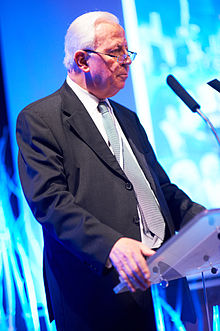Jacques Santer
| Jacques Santer | |
|---|---|
 |
|
| President of the European Commission | |
|
In office 25 January 1995 – 15 March 1999 |
|
| Preceded by | Jacques Delors |
| Succeeded by | Manuel Marín |
| Prime Minister of Luxembourg | |
|
In office 20 July 1984 – 26 January 1995 |
|
| Monarch | Jean |
| Preceded by | Pierre Werner |
| Succeeded by | Jean-Claude Juncker |
| Personal details | |
| Born |
18 May 1937 Wasserbillig, Luxembourg |
| Political party | Christian Social People's |
| Religion | Roman Catholicism |
Jacques Santer (born 18 May 1937 in Wasserbillig) is a Luxembourg politician.
He was finance minister of Luxembourg from 1979 until 1989, and the 22nd Prime Minister of Luxembourg from 1984 to 1995, as a member of the Christian Social People's Party, which has been the leading party in the Luxembourg government since 1979. As Prime Minister of Luxembourg he also led the negotiations on the Single European Act, which effectively set aside the 20-year-old Luxembourg Compromise. He was the President of the European Commission from 1995 to 1999.
He graduated in 1959 from the Paris Institute of Political Studies, and received his doctorate in law in 1961. From 1972 to 1974 he was a junior minister in the government. From 1979 to 1984 he was Minister of Finance, Minister for Work and Minister for Social Security, under Pierre Werner, in the coalition government between the Christian Social People's Party (CSV) and the liberal Democratic Party.
After the general election of 1984, Pierre Werner retired as Prime Minister and from political life in general, and Santer became the new Prime Minister. He and the CSV now formed a new coalition with the Luxembourg Socialist Workers' Party (LSAP), which had come out of the elections as the second-largest party in the legislature, beating the Democratic Party into third place; the CSV remained the largest party. This CSV / LSAP coalition was to last until 1999.
On 10 November 1990 an article appeared in the newspaper vum Lëtzebuerger Vollek, which translates into "Five years of state secret - The bombing NATO terror commando" that caused a parliament inquiry in which Santer was forced to reveal the existence of a stay-behind army in Luxembourg and being politically responsible to call for its dissolution. The organisation was active since its creation by the then prime minister Pierre Werner in 1959 and was organised by the secret service of Luxembourg, the Service de Renseignement de l'Etat (SREL) and coordinated by the NATO. On 17 December 1990 he told the constitutional committee the organisation had never more than 12 members and was only foreseen to handle intelligence operations, as well as escape and evasion manoeuvers. There were weapons caches established in 1973, but direct access would not have been granted, according to Santer. On 14 October 1990 the remaining members of the organisation were informed and requested to return their radio communication equipment.
...
Wikipedia
